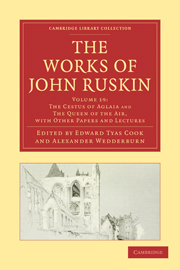Book contents
- Frontmatter
- Contents
- LIST OF ILLUSTRATIONS
- INTRODUCTION TO THIS VOLUME
- PART I “SIR JOSHUA AND HOLBEIN” (1860)
- PART II “THE STUDY OF ARCHITECTURE IN SCHOOLS” (1865)
- PART III “THE CESTUS OF AGLAIA” (1865, 1866)
- PART IV “THE RELATION OF NATIONAL ETHICS TO NATIONAL ARTS,” BEING THE REDE LECTURE FOR 1867
- PART V “ON THE PRESENT STATE OF MODERN ART, WITH REFERENCE TO THE ADVISABLE ARRANGEMENT OF A NATIONAL GALLERY” (1867)
- PART VI “FAIRY STORIES”: A PREFACE TO “GERMAN POPULAR STORIES” (1868)
- PART VII “THE FLAMBOYANT ARCHITECTURE OF THE VALLEY OF THE SOMME” (1869)
- PART VIII “THE QUEEN OF THE AIR” (1869)
- PART IX “VERONA, AND ITS RIVERS” (1870)
- APPENDIX: REPORTS OF ADDRESSES ON ART
- I ARCHITECTURE IN FRANCE (186l)
- II COMPETITION AND MECHANICAL ART (1865)
- III THE THREE-LEGGED STOOL OF ART (1868)
- Plate section
II - COMPETITION AND MECHANICAL ART (1865)
Published online by Cambridge University Press: 05 November 2011
- Frontmatter
- Contents
- LIST OF ILLUSTRATIONS
- INTRODUCTION TO THIS VOLUME
- PART I “SIR JOSHUA AND HOLBEIN” (1860)
- PART II “THE STUDY OF ARCHITECTURE IN SCHOOLS” (1865)
- PART III “THE CESTUS OF AGLAIA” (1865, 1866)
- PART IV “THE RELATION OF NATIONAL ETHICS TO NATIONAL ARTS,” BEING THE REDE LECTURE FOR 1867
- PART V “ON THE PRESENT STATE OF MODERN ART, WITH REFERENCE TO THE ADVISABLE ARRANGEMENT OF A NATIONAL GALLERY” (1867)
- PART VI “FAIRY STORIES”: A PREFACE TO “GERMAN POPULAR STORIES” (1868)
- PART VII “THE FLAMBOYANT ARCHITECTURE OF THE VALLEY OF THE SOMME” (1869)
- PART VIII “THE QUEEN OF THE AIR” (1869)
- PART IX “VERONA, AND ITS RIVERS” (1870)
- APPENDIX: REPORTS OF ADDRESSES ON ART
- I ARCHITECTURE IN FRANCE (186l)
- II COMPETITION AND MECHANICAL ART (1865)
- III THE THREE-LEGGED STOOL OF ART (1868)
- Plate section
Summary
1. The lecturer commenced his address by stating that ill-health and a pressure of work had prevented him from being with them as often as he could have wished; but he had the satisfaction of knowing that they had very good masters in Messrs. Lowes Dickinson, Jeffrey, and Cave-Thomas. When he was with them he also felt that he was not exactly the person they wanted. He could best illustrate what he meant by telling them a thing which struck him very much at the time he attended the classes. One of the best men in his class gave him great satisfaction by the execution of his work, which made him think his pupil had a great perception of beauty. He exhibited much tenderness and grace in his expression. He (Mr. Ruskin) believed most of them grumbled because he did not praise them enough; still, he thought they would do him the justice of saying that he grumbled at his own work as well as at theirs. He was a grumbler generally. However, one day he said to this student that his work was very good—very nice. On hearing this the student fell back in his chair and laughed almost like a child. He was intensely delighted with the praise. Now, he watched them more closely after that, and saw how strongly the love of praise and the instinct of competition were in their minds; that it was not so much a love of what they did as the delight either in the personal sense of having done it well, to which there was no objection, or the doing it better than others.
- Type
- Chapter
- Information
- The Works of John Ruskin , pp. 465 - 468Publisher: Cambridge University PressPrint publication year: 2010First published in: 1905



